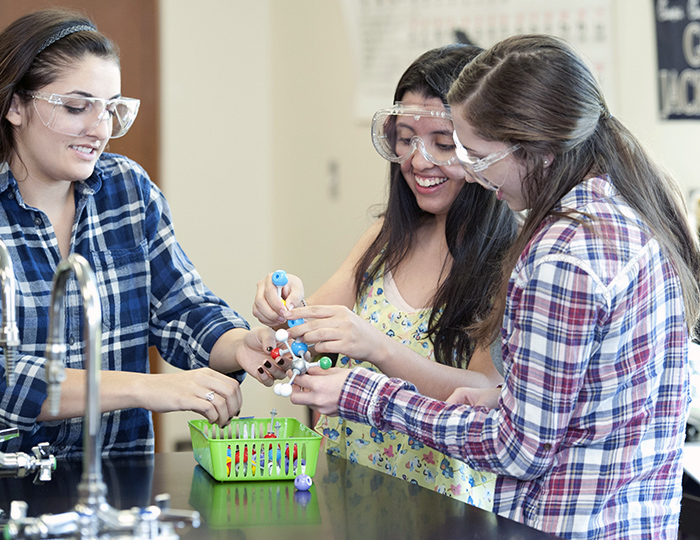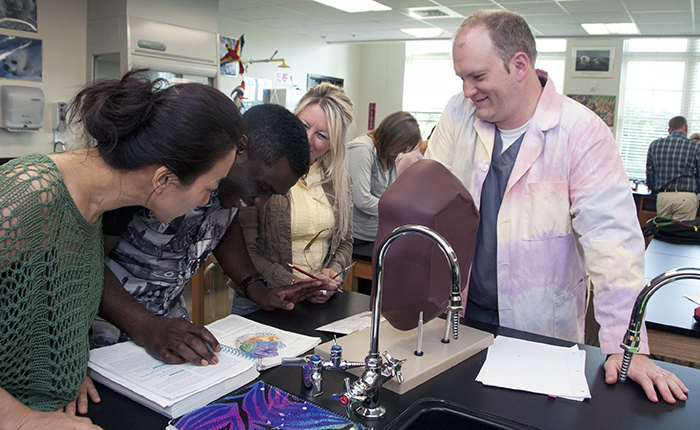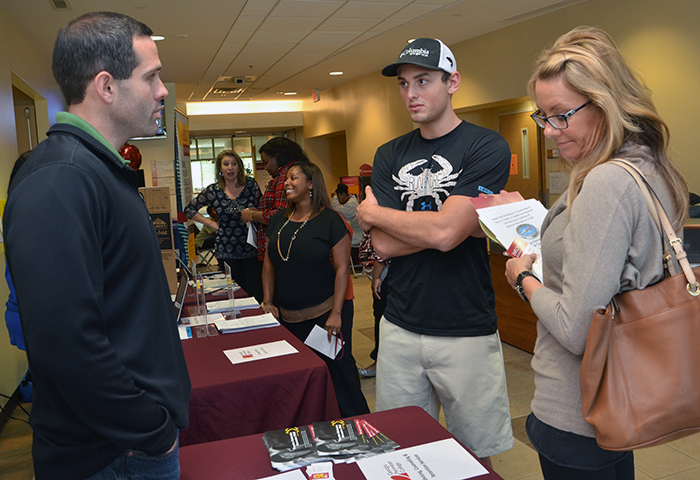
Alpharetta Campus students, from left, Kate Miller, Bridgette Galindo and Maris Bonoobenburg work in new science labs. (photo by Bill Roa)

GPC science lab instructor Richard Dry directs Alpharetta students in experiments. (photo by Bill Roa)

Potential GPC student Nick Hinger and his mom Audrey Hinger gather information at a fall open house at GPC Alpharetta. (photo by Leita Cowart)
Good things are happening at Alpharetta Campus
Science and other course offerings are on the uptick at Georgia Perimeter College’s Alpharetta Campus, right alongside a boom in student enrollment.
“Every time we have offered something new in science, the students have shown up,” says Dr. Laura Whitlock, Alpharetta mathematics, science, business and computer science department chair.
Aspiring hydrologist and geology major Katy O’Connell Nahodyl is among the growing population of GPC Alpharetta students.
“I feel very positive about my experience at Georgia Perimeter College,” Nahodyl says, noting that she will transfer to Georgia State University next semester.
Meantime, projections for GPC’s spring enrollment are up overall, with Alpharetta—GPC’s smallest campus—showing the largest percentage increase. Enrollment increased 13.6 percent fall 2013 to fall 2014.
Since 2009, the number of students attending Alpharetta has more than doubled jumping from 1,019 to 2,100. GPC first began serving students in Alpharetta in 2000, using rented classroom space at Georgia State’s facility, and then in 2010 opened its own dedicated building.
Dr. Susan Cody, GPC’s college-wide dean of social sciences and Alpharetta dean of academic services, points to a few reasons for the jump in students.
For starters, she believes the growth at GPC-Alpharetta is reflective of the overall growth in this northern corridor of metro Atlanta.
Dual Enrollment has been a big help, too. Currently, GPC has 1,306 DE students, with more than half taking classes at Alpharetta. Ramped-up academic advising and recruiting get big credit for the DE spike.
Then there is the deluge of new course offerings. “We’re really expanding quite a bit,” Cody says.
Until now, Alpharetta—which just became a full-fledged campus over the past year—didn’t have an abundance of science classes. Physics, astronomy, chemistry, biology, upper-level math and computer science labs are among the added courses offered this semester, with even more on tap for spring.
Additionally, Whitlock is confident that the inclusion of wet labs for science majors is contributing to Alpharetta’s growth. Wet labs are laboratories where chemicals, drugs and other material or biological matter are handled in liquid solutions or volatile phases. They require direct ventilation and specialized piped utilities, typically water and various gases.
“There was just no question that we needed to have access to wet labs,” Whitlock says of the push to get them. The college looked at several options for providing the science labs, but in the end a partnership with nearby Kings Ridge Christian Academy won out. Presently, two classes of GPC students are utilizing the wet labs at Kings Ridge in the evenings, as part of a deal worked out between the private school and Georgia Perimeter. Whitlock says there could be as many as eight labs offered there next year at this time.
“It’s a good, short-term, easy fix, because everybody wins—GPC, students and Kings Ridge,” Whitlock says, adding that eventually Alpharetta Campus will get its own wet labs.
Additional courses and labs also have meant an expansion of faculty, including six new science instructor positions since last year.
“Growing science was fundamental to what we wanted to do,” Whitlock says.
Outside of the sciences, Alpharetta also is growing in terms of offerings in film and philosophy, Cody says. All of this, she believes, signals a strong future for GPC-Alpharetta.
“Even though we’re small,” she says, “we’ve taken that and made our weakness a strength.”
